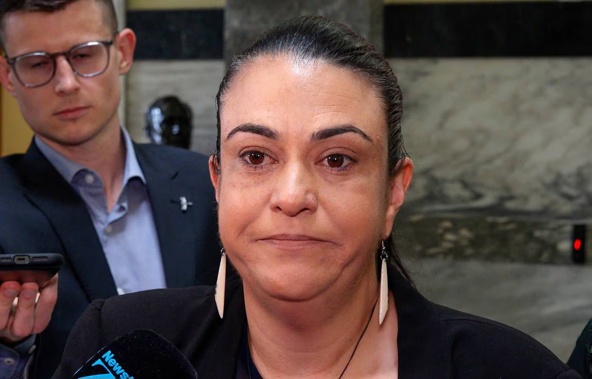
A legal battle to get Children’s Minister Karen Chhour to appear before the Waitangi Tribunal over plans to remove Oranga Tamariki’s Treaty obligations to tamariki Māori in state care is going back to court.
In a decision last night,the High Court ruled Chhour couldn’t be compelled to appear before the Tribunal, with Justice Andru Isac granting the Crown’s application for judicial review.
This set aside the summons issued by the tribunal.
High profile Treaty lawyer Annette Sykes, representing Ngāti Te Rangiunuora - a hapū of Ngāti Pikiao - confirmed this morning an appeal was lodged late last night.
“We’re happy with some of the findings, but wondered why the judicial review was successful in light of that reasoning, and we were instructed by our clients to seek an appeal immediately.”
In his ruling yesterday, Justice Isac noted the mana of the tribunal and the importance of its work was not diminished by his decision.
The judicial review challenged an unprecedented request from the tribunal earlier this month for Chhour to appear before an urgent inquiry on the Government’s decision to repeal section 7AA of the Oranga Tamariki Act.
It summonsed the minister to appear by tomorrow.
Section 7AA requires the agency to have regard to its Treaty obligations by ensuring it takes into account the whakapapa of Māori children and reduces disparities for tamariki Māori.
It was introduced in 2017 by the previous National government. The plan to scrap the section was one of the coalition agreements between National and Act last year.
They had to move fast with the appeal, Sykes said.
“The Government … have intimated they would likely introduce legislation in the middle of May. If they did that, that would deny the Waitangi Tribunal jurisdiction to look at the issues before the tribunal at the moment.
“So that’s why there’s urgency in this matter.”
She didn’t know if others planned to appeal, but expected they’d be “reflecting on their position and seeking instructions today”.
“But we have had words of support from people from Kīngitanga and Tainui leadership … and the Māori Women’s Welfare League.
“I think it was gracious of them to say they stood with us at this time. So Ngāti Pikiao are certainly not feeling alone.”
Children’s Minister Karen Chhour says section 7AA has created conflict between protecting the best interests of the child and race-based factors enshrined in the section. File photo / Mark Mitchell
In a brief statement yesterday, Chhour said she welcomed the High Court decision not for her own sake, but for the constitutional clarity it provided for New Zealand.
Because parties have the right of appeal she was limited in what she could say, Chhour said.
Chhour, who is Māori and spent time in state care as a child, has previously said section 7AA created conflict between protecting the best interests of the child and race-based factors enshrined in the section.
In his decision yesterday, Justice Isac said he was required to answer two questions.
Firstly, was the evidence that would be provided by the summons relevant in light of the material already provided to the tribunal by the Crown?
And, secondly, did issuing a summons infringe the principle of comity - the mutual restraint and respect between the branches of Government?
In making his decision, he was unable to accept the minister’s submission that the summons was unlawful in this case because there was already other relevant evidence available to the tribunal.
But he accepted the Crown’s second argument of comity, noting there were limits on the power to summon.
This included whether the evidence was “clearly necessary” - a higher test than “mere relevance”.
Māori children are disproportionately taken into state care by Oranga Tamariki at a rate of five times non-Māori children, according to Ngāpuhi Iwi Social Services chief executive Dr Moana Eruera. File photo / RNZ / Angus Dreaver
A summons also couldn’t put the minister in conflict with collective responsibility and Cabinet confidentially, he said.
“Had I concluded that the lack of evidence would affect the tribunal’s ability to discharge its statutory functions, I would have dismissed the application for judicial review.
“It goes without saying, then, that the power of the tribunal to summons a serving minister to attend and give evidence under compulsion, if clearly necessary, is very much alive.”
This story was originally published on the Herald, here
Take your Radio, Podcasts and Music with you









